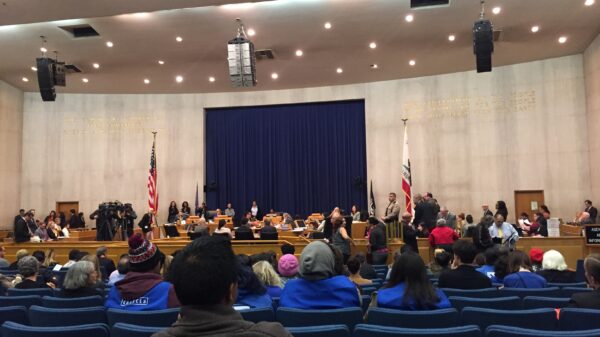SANTA ANA — Participatory democracy, in which constituents are free to comment on the actions and views of elected officials, is one of the cornerstones of our nation. But not at the Orange County Board of Supervisors, where meetings are held in a manner more befitting a monarchy.
Public comments (unless complementary to the Board) are severely restricted, and members of the public must ask permission to address individual supervisors.
Today, the American Civil Liberties Union Foundation of Southern California and the law firm Kirkland & Ellis LLP filed a lawsuit charging that the Board violates California's landmark Brown Act as well as the U.S. Constitution and California Constitution for deploying Rules of Procedures that "actively attempted to silence the people, stifle debate, and shield its members from criticism by erecting barriers to the people's participation in board meetings."
In addition to the Board's actions at meetings, the suit charges that supervisors unlawfully refuse to produce public records and have re-categorized records in such a way that gives the Board license to destroy them.
"The Orange County Board of Supervisors is among the least transparent and least accountable government bodies in the state of California, if not the country," said ACLU SoCal Staff Attorney Brendan Hamme. "It is well past time for the supervisors to realize that the residents of Orange County are constituents to be served, not obstacles to be avoided."
The suit was filed in Superior Court in Santa Ana on behalf of the People's Homeless Task Force, an organization of concerned community members in Orange County who advocate for people experiencing homelessness. The group strives to find and promote real-world solutions to homelessness that has become epidemic in the county. Studies show that on any given night, approximately 4,400 people in Orange County experience homelessness.
Members of the People's Homeless Task Force regularly attend Board of Supervisors meetings where they have been critical of Board actions that have not only fallen woefully short in dealing with the situation, but have in some cases made matters even worse. The Board's reaction to their criticism has been to try to stifle it.
Supervisors have given themselves almost unlimited power to restrict and control public comment at open meetings. The Board's Chairperson, sometimes seemingly on a whim, sets time limits so restrictive for individual comment that there is no chance for serious input. And if a supervisor interrupts a member of the public making a comment, that oftentimes counts as part of the time allotted.
In addition, the Board has moved the public comment section of meetings to make it as inconvenient as possible for potential speakers. And the rule preventing a speaker from addressing remarks to an individual supervisor would be comical if it was not so ludicrous.
"Deliberate encroachment on the public's ability to speak is intended to silence dissent, be it through the slashing of time available to each speaker, or shifting public comment periods to the indeterminate end of an open meeting", said Jeanine Robbins of the People's Homeless Task Force. "This right of Americans to address public officials is engrained in our Constitution. A desire to remain willfully ignorant does not provide a magical loophole by which public speech can be curtailed."
The Board's actions to stifle dissent and shield itself from public scrutiny are not only boorish and imperial, they're also against the law. Its rules violate rights guaranteed by the First Amendment of the U.S. Constitution, provisions of the California Constitution, and state law. Its procedures violate the Government Code, including the California Public Records Act due to the destruction of documents that must, by law, be preserved.
The lawsuit asks the court to force the Board to permanently dispense with rules and policies that unlawfully restrict the public's participation in meetings and inhibit government transparency, accountability and effective oversight.
Read the lawsuit here: https://www.aclusocal.org/app/uploads/drupal/sites/default/files/aclu_socal_ocbos_20190409_complaint.pdf
###
Stay Informed
Sign up to be the first to hear about how to take action.
By completing this form, I agree to receive occasional emails per the terms of the ACLU’s privacy statement.
By completing this form, I agree to receive occasional emails per the terms of the ACLU’s privacy statement.

